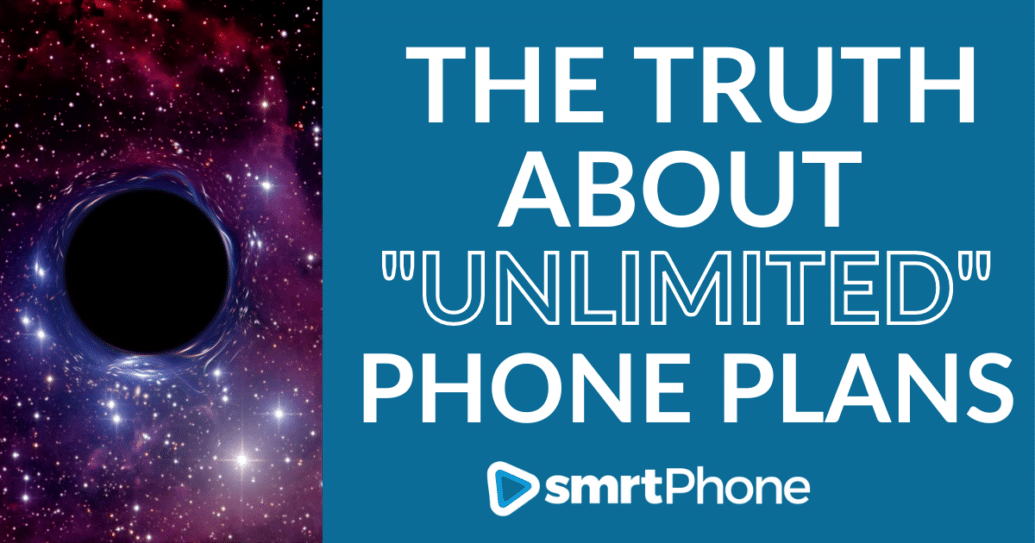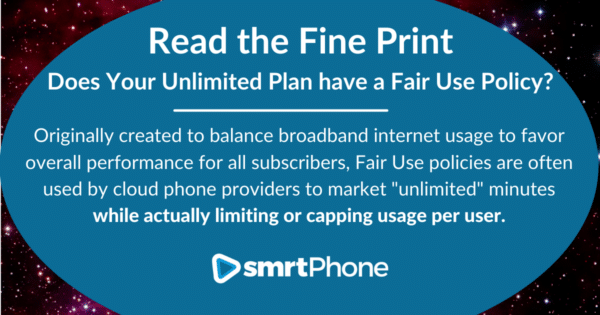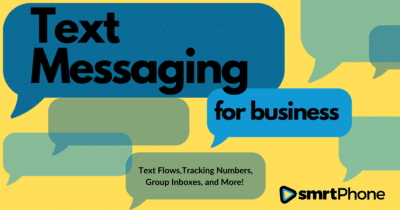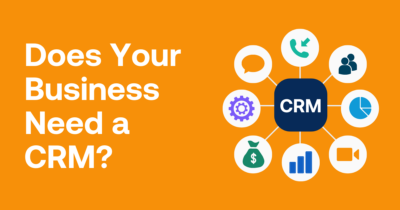Are Unlimited phone plans fake?
What type of business phone plan pricing is right for you?
When you’re deciding what type of phone system fits your business needs, price inevitably becomes an important component to consider. You never want to limit the amount of calls your hardworking employees make and receive, so ‘unlimited’ options feel especially compelling. On the other hand, your business might ebb and flow in call volume or staff, and locking into an unlimited plan might be an unnecessary overhead cost. Your phone plan should be working for you, not just dispensing minutes. And to make things even more complicated, unlimited might not always mean unlimited!
Understanding Unlimited Business Phone Plans
Unlimited business phone plans usually charge a set fee per month, per user. They draw you in with the seemingly limitless opportunity to be making and receiving calls. But providers only offer unlimited because it makes them money, but you lose the ability to see exactly where. It all becomes opaque to you as the business owner. Plus, there are often caps and regulations to keep you from actually getting unlimited minutes. Fair Usage policies allow for a legal capping of minutes, even while advertising as unlimited. The caps can sound high – 1,000 minutes or 4000 text messages – until you realize how many employees you have, making calls all day! Your inside sales team will blow through 16 hours of calls in less than a week, let alone in a month.
- Rigid, Fixed Pricing: Even the plans that don’t have caps push a uniform price that doesn’t take into account your business’ ebbs and flows in call volume. Many businesses have more active and less active time periods and don’t need unlimited minutes every month – yet you’re locked into paying the premium.
- Potential for Overages: While it would be reasonable to think that month to month your costs would be stable, many businesses find that with the fair use policies under unlimited phone plans, actual phone costs are anything but predictable. If you regularly reach your fair usage cap, you will be charged a premium for overages.
- Uniform Employees?: Another drawback to unlimited plans is how difficult it can be to differentiate between types of employees. What if you have part-time employees who only need limited access to minutes, such as a virtual assistant or an intern? Unlimited plans will force you into paying for a full time employee without considering the unique makeup of your business.
- Only Part of the Plan is Unlimited: While the promise of unlimited minutes can be appealing, it often distracts from hidden fees that bring unlimited plans up to par – if not more expensive – with alternative pricing models. For example, many unlimited plans limit you to one phone number per user, which will throttle a marketing-driven organization. In an effort to give you “more minutes,” the plans hobble your ability to do your job the way you need to. Despite its name, unlimited plans often come with complicated, sneaky parameters that do less to help your company and more to make money for the carriers.
Get Greater Control Over Phone System Costs with The Pay as you Go model
Pay as You Go business phone plans allow you to pay only for what you use, usually per minute or text. Depending on the carrier, there may be different charges for inbound and outbound calls, or limits on how many characters a text can contain before it counts as two messages. Transparency ends up being the most important factor when choosing a Pay as You Go model. Data reporting and detailed call logs allow for deeper understanding and therefore more control in what you use. The open, transactional nature of the plan actually creates opportunity to change and adapt your business practices depending on what’s working, and what isn’t.
Flexibility to Fit Your Business: The biggest selling point of the Pay as You Go model is the ability to match your phone system to your unique business. Moving away from the one-size-fits all approach of unlimited plans means that your phone system can be easily customized to meet your needs at any stage of growth.
Not Just About the Minutes: Besides just dispensing minutes, your phone plan should provide additional services that help you learn more about your business, and in turn, help you run it more efficiently. Don’t just think about hard costs – think about ways in which your phone plan can save you time, which can end up being more cost-efficient in the long run.
Rethinking Cost as Value
The truth is, your pricing decision is not as black and white as “unlimited vs. pay as you go.” Systems and integrations that make your workflow leaner and more efficient can end up saving you both time and money.
Think of it this way: if you are saving time making your calls, you can make more calls. When productivity increases, so does your bottom line. If you have to take 2 minutes to find your contact’s information, bring it into your phone system, dial, carry on the conversation, and then go back to your CRM and hand-enter notes for 2 minutes – you’re adding 4 minutes to every phone conversation. While you may have felt like you paid less for the actual conversation – what truly was the cost to your business?
When you reframe the cost conversation to include both hard and soft costs, it shines a light on hidden fees and potential inefficiencies.
smrtPhone marries the Pay as You Go model with a lean workflow.
Finding the right phone system should be a decision based not only on how much minutes cost, but how your new system can eliminate unnecessary employee time wasted, increase workflow efficiency, and improve productivity.
smrtPhone pricing includes a small monthly subscription plus transactional usage – both are paid at the account level, giving you full flexibility with your staffing and phone number management. (Click here for more information on smrtPhone pricing).On top of a Pay as You Go model, smrtPhone operates with deep CRM integration that further eliminates waste and puts the heavy lifting for administrative tasks onto the technology. This frees up your employees to focus where only people can: on carrying out empathetic and proactive human conversation. In the end, after all, it’s not your phone system that closes deals but your people using the phone system that make sales happen.
- Seamlessly connected to your CRM. Using smrtPhone, you can text in and out of Podio or Salesforce/Left Main while automatically storing client notes, call recordings, and call logs. The time you save by not having to search for contacts, transcribe notes, assign tasks manually, or re-type information ends up saving you time (and money.)
- Power automation. Because of the deep integration with your CRM, calls and texts placed through smrtPhone can power automations that advance workflows and keep your pipeline data accurate. Or, vice versa, specific actions in your CRM can trigger texts or place a prospect in queue for a power dialing campaign. The lack of needed human intervention to make these things happen accelerates your business growth versus handling it all manually.
- Customizable incoming communication flows that ensure calls and texts never fall through the cracks. The flexibility to route calls based on Users, Groups, and Business Hours – plus the free, full-featured mobile apps – means “Phone tag” won’t bog down your client relationships.
- Granular data reporting allows you to analyze which phone numbers, marketing campaigns, team members, and clients yield the highest ROI, which gives you the insight you need to make better decisions.
- Radical transparency with pricing: For every charge, there is direct access within your system to billing and logs that can match your expense with the activity. This puts you in control of the cost of doing business, highlighting bottlenecks or leakage in your pipeline, and giving you a truer sense of the cost of sales. Your profitability depends on it.
- Simple billing with no surprises: In addition to transparency with what each transaction costs you, with smrtPhone you never get a surprise bill. All transactional costs (such as call minutes, outbound text messages, and call recording storage) come out of a pre-paid credit balance. This means you’ll never get to the end of the month and suddenly realize you’re deep under water. Any unusual activity can be easily detected if your balance gets low, keeping your finger on the pulse of your organization’s communications.
In the end, it’s important to understand that as appealing as Unlimited sounds on the surface, it often results in a rigid system that is “one size fits some” – and feels too tight or too loose on your unique business. Don’t reduce the decision around your phone plan to simply “unlimited” vs. “pay as you go,” because it’s not all about minutes. It’s about which phone plans give you control over your business, the transparency to find out what’s working best, and the flexibility to build a system that works for you. Your phone plan should be making your work easier, which translates to more productivity and ultimately, more money back into your company.







